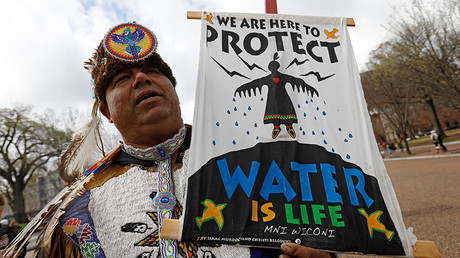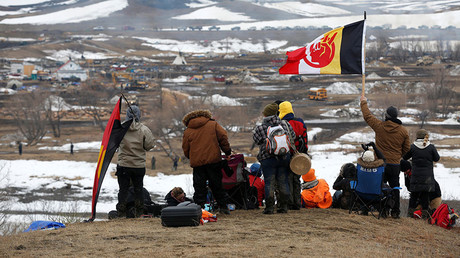States seek to criminalize protests against ‘critical infrastructure’ following DAPL standoff
Bills aimed at expanding penalties against protesters targeting “critical infrastructure” such as pipelines are pending in half a dozen US states. The moves conspicuously got a boost after the Dakota Access Pipeline protests.
The protests under hashtag #NODAPL that spilled from Standing Rock Indian reservation nationwide and lasted for several months in 2016 have apparently brought the US authorities enough trouble so that lawmakers are creating legislation that would “protect” some “critical infrastructure”, oil and gas pipelines in particular, from that sort of actions.
The bills has gone through the final stages of the legislative process in Minnesota and Louisiana without any hurdles or much public debates or attention. The states host parts of the Bakken system, which includes both the Dakota Access Pipeline and the Energy Transfer Crude Oil Pipeline linking oil fields in North Dakota and the Mexican Gulf Coast. They do not just seek to prevent any potential protesters from damaging the facilities but would also penalize trespassing into the “critical infrastructure” territory and even discussing the action.
A legislation introduced in Minnesota actually envisages penalties amounting to up to one year in jail for anyone, who “recruits, trains, aids, advises, hires, counsels, or conspires” with anyone seeking to trespass into a critical infrastructure facility. The penalty can also be increased to as many as 10 years in jail if the trespasser intends to “substantially disrupt” the facility.
This wording can potentially be applied to peaceful protests blocking access to some infrastructure, which, under the Minnesota laws, can be defined to include even bus stations and bridges, the International Center for Not-for-Profit Law warned in its US Protest Law Tracker, implying that such a legislation could open broad opportunities for a government crackdown against peaceful protesters.
In Louisiana, where it is already illegal to trespass into critical infrastructure facilities, the lawmakers went even further. According to their bill passed this week, those “conspiring” to trespass into a critical infrastructure territory could be sentenced to up to five years in prison. If determined that this conspiracy could potentially lead to disruption of the work at the facility, the sentence could increase to six or even 20 years in prison.
The legislation also significantly broadens the definition of “critical infrastructure” to explicitly include “pipelines” as well as “any site where the construction or improvement of any facility or structure.” As a result, any protester could be potentially sent to prison for taking part in a rally at a pipeline construction site or for even discussing it, if the bill is adopted.
These two legislations are far from being some isolated cases. A bill envisaging huge fines for the protesters was adopted in Oklahoma in May 2017. Similar legislations were introduced by Iowa, Ohio and Pennsylvania as well as Wyoming.
The Ohio and Pennsylvania bills are pending while the Iowa legislation was passed in April. In Wyoming, the bill passed the legislature before being eventually vetoed by the governor.
The $3.8 billion Dakota Access Pipeline (DAPL) is a 1,172 mile (1,866 km) underground pipeline, built to carry oil from the Bakken shale oil fields in North Dakota to the oil tank farm in Illinois. In 2016, a number of Native American tribes in the North and South Dakota opposed the pipeline construction, arguing it would threaten their sacred burial grounds as well as their sources of fresh water.
Beginning in April 2016, the Standing Rock Sioux Tribe set up a protest encampment near Lake Oahe on the Missouri River. Over the course of the summer the camp grew to thousands of people. At some point, Energy Transfer Partners (ETP), the corporation behind the Dakota Access Pipeline, bulldozed a section of the land that the Standing Rock documented as a historic, sacred burial site. The move forced the protesters to enter the area, where they were attacked by private security workers, who used attack dogs and tear gas.
In late October, the National Guard and police with riot gear and military equipment cleared the encampment over claims the area wasn’t safe because of winter temperatures. The construction that was temporally suspended by the Obama administration was eventually greenlighted by Donald Trump.
The protesters were also subsequently sued by the ETP that accused them of being “eco-terrorists.” In the meantime, a private security firm hired by the ETP to provide security consulting for the DAPL project, which was accused of sweeping and invasive surveillance of protesters, is seeking the settlement for the accusations. It is ready to pay fines as long as it does not have to admit any wrongdoing.
“The reason they are doing it is that they are worried about the fact that all this information that they gathered becomes useless in subsequent lawsuits that would follow,” Mike Papantonio, an American attorney and a TV presenter, who hosts the "America's Lawyer" show on RT America, said, commenting on the issue.
“What the company is likely to do here is just to protect information that they illegally gathered,” he said, adding that this firm “did a lot of [things] wrong,” and a series of lawsuits against it could still “become very significant.”





